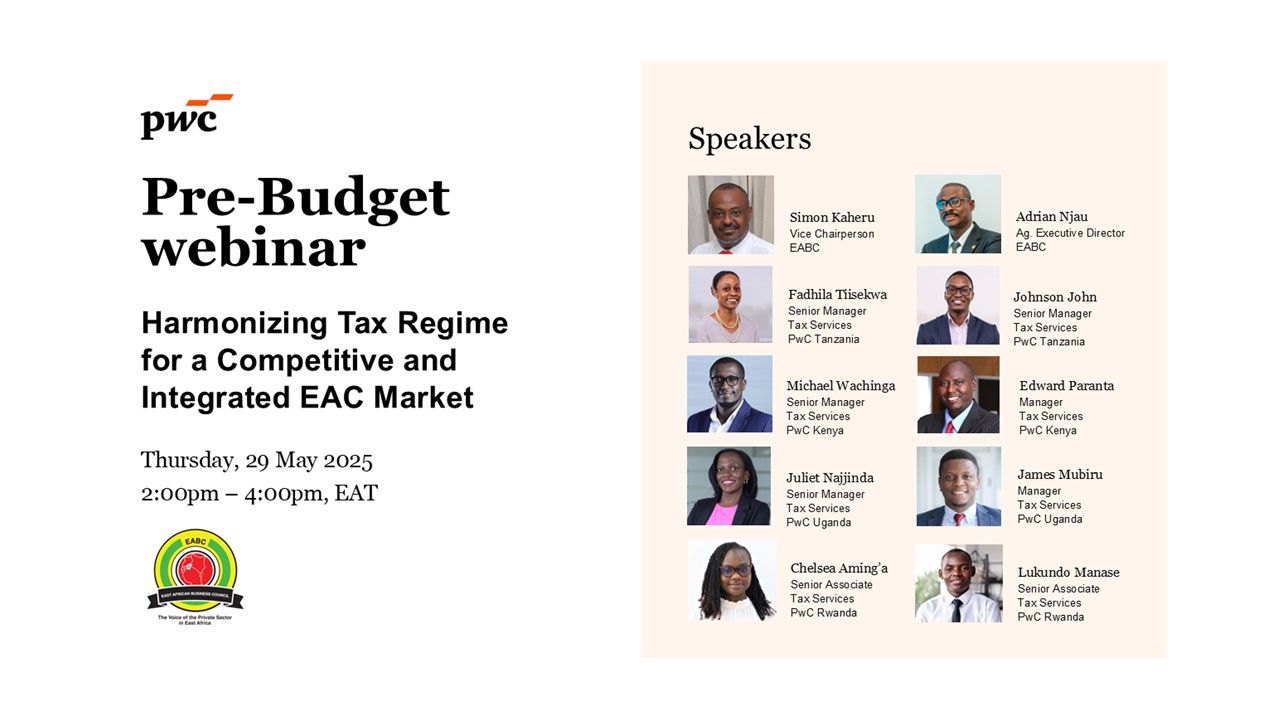Friday, 30th May 2025, Arusha, Tanzania: – Speaking during the Pre-Budget Webinar for the fiscal year 2025/26, held under the theme “Harmonizing Tax Regimes for a Competitive and Integrated EAC Market,” Organized by the East African Business Council (EABC), in collaboration with PwC; Mr. Simon Kaheru, Vice Chairperson of the East African Business Council (EABC), urged the governments of EAC Partner States to fast-track the harmonization of domestic tax disparities to make the region an attractive and unified investment destination.
Mr. Kaheru further urged governments to incorporate private sector proposals into the 2025/26 budgets, which are scheduled to commence on 1st July 2025, in a bid to build a cohesive and prosperous regional market.
In his remarks, Mr. Adrian Raphael Njau, Acting Executive Director of EABC, encouraged the private sector to actively engage in national pre-budget consultations to enhance the business environment and ensure that proposed tax measures align with the objectives of EAC regional integration.
The webinar provided insights into proposed tax measures, including updates on the EAC Common External Tariff (CET) and changes in domestic taxes—VAT, income tax, excise duty, and others—for the 2025/26 fiscal year across EAC Partner States: Kenya, Rwanda, Tanzania, and Uganda. These measures were examined in terms of their implications for regional businesses.
Mr. Frank J. Dafa, Manager of Trade in Goods at EABC, presented on the challenges of harmonizing excise duties in line with the 2019 EAC Policy on Harmonization of Domestic Taxes. The policy calls for EAC Partner States to harmonize and coordinate the list of dutiable goods and services, determine optimal rates, define the tax base for excise duties, and adopt a consistent excise tax regime (ad valorem, specific, or hybrid).
The EAC Fiscal Affairs Committee have proposed a minimum excise duty rate of USD 6 per litre of 100% alcohol content across the EAC, which translates to (USD 0.3 per Litre of Beer), (USD. 0.72 per Litre of Wine), and (USD. 2.4 per Litre of Spirits). However, the Partner States have divergent views on the minimum rates for tobacco and other nicotine products, non-alcoholic beverages, and fossil fuels.
Corporate income tax rates are lowest in Rwanda at 28%, compared to 30% in Tanzania, Kenya, and Uganda. Taxes on employers—which include social security, the skills development levy, workers’ compensation, and maternity benefits—stand at 14% in Tanzania, are nominal in Kenya, 10% in Uganda, and 8.3% in Rwanda. Taxes on employees, covering income tax, social security, and maternity benefits, are 40% in Tanzania, 35% in Kenya, 45% in Uganda, and 36.3% in Rwanda. (According to PwC Analysis)
Withholding taxes on dividends and service supplies for non-residents differ from those for locals and range from 10% to 15% across EAC countries, creating a discriminatory environment for EAC service suppliers Unharmonzied domestic tax disparities hinder the optimal allocation of resources and restrict the movement of goods, services, service suppliers, workers, capital, and investment across the region.
Notes to Editors: –
Highlights of Tanzania, Kenya, Uganda and Rwanda Financial Bills 2025/26
Private Sector Recommendations for the Tanzania 2025/26 Budget:
- Early release of the Finance Bill.
- Overhaul of the Tanzania Excise Duty Act.
- Lower corporate tax for SMEs.
- Reduction of the Skills Development Levy to 3%.
- Reduction of excise duty on telecom services from 17% to 10%.
Proposed Amendments in Kenya Finance Bill 2025/26 include:
Income Tax:
- Limitation of tax loss carryover to 5 years (currently indefinite).
- Removal of 100% and 150% investment deduction rates for investments over KES 1 billion outside Nairobi and Mombasa.
- Expansion of “royalty” definition to include software distribution with regular payments.
- Elimination of the KES 5 million threshold to trigger Significant Economic Presence Tax.
- Reduction of Digital Asset Tax from 3% to 1.5%.
- Introduction of Advance Pricing Agreements for transactions under Transfer Pricing rules.
Employment Tax:
- Increase of tax-exempt per diem threshold from KES 2,000 to KES 10,000.
- Repeal of tax exemptions for certain expatriate employees.
- Tax exemption for gratuity payments from both public and private schemes.
- Mortgage interest deductions for construction of residential premises.
- Repeal of tax exemption on early pension withdrawals.
- Alignment of Fringe Benefit Tax rate with resident corporate tax rate.
VAT:
- VAT refund claim period reduced from 24 to 12 months.
- Bad debts VAT refund period reduced from 3 to 2 years.
- Mandatory issuance of tax invoice for all supplies.
- Tax imposed on exempt or zero-rated goods misused for other purposes.
- Change in VAT status:
- From zero-rated to exempt: raw materials for pharmaceutical manufacturing, animal feed, electric vehicles, mobile phones.
- From exempt to standard-rated (16%): inputs for locally assembled tourist transport vehicles and passenger motor vehicles.
Excise Duty:
- Definition of “digital lender” expanded to include all electronic credit providers (excluding banks, SACCOs, MFIs).
- Excise applied to non-resident digital services.
- Commissioner to respond to excise license applications within 14 days.
- New excise duty of KES 500/litre on undenatured extra neutral alcohol.
Proposed Amendments in Uganda Finance Bill 2025/26 include:
Income Tax:
- 3-year income tax exemption for citizen-owned businesses established post-1 July 2025 with capital below UGX 500 million.
- Rollover relief expansion for non-individual asset transfers.
- Restriction of digital service tax on services by non-residents to associates in Uganda.
- Income tax exemptions for the International Atomic Energy Agency and Bujagali Hydro Power Project.
VAT:
- Aggregated import consignments to be registered to prevent undue tax advantage.
- Supply of aircraft made zero-rated.
- Exemption of solar lanterns and biomass pellets.
- Repeal of VAT exemption on billets.
- Extension of VAT exemptions to UN and specialised agencies.
Excise Duty:
- Cigarette excise duty increases:
- Softcap: UGX 55,000 to UGX 65,000 (local); UGX 75,000 to UGX 150,000 (imported).
- Hinge lid: UGX 80,000 to UGX 90,000 (local); UGX 100,000 to UGX 200,000 (imported).
- Excise duty on sacks and bags limited to HS codes 3923.21.00 and 3923.29.00, excluding specific food and sanitary packaging.
- Beer with 75% local content: excise duty increased from UGX 650 to UGX 900.
- Fuel excise duty:
- Petrol: UGX 1,550 to UGX 1,650/litre.
- Diesel: UGX 1,230 to UGX 1,380/litre.
- Introduction of remission mechanism for excise duty on Ex-Factory Goods under EDA.
External Trade (Amendment) Bill 2025:
- 1% import declaration levy on customs value.
- 1.5% infrastructure levy on goods for home use (with certain exemptions).
- US$10/metric tonne export levy on wheat bran, cotton cake, and maize bran.
Rwanda has announced a comprehensive tax policy reform plan that will span six fiscal years, from 2024/2025 to 2029/2030.
Objectives of the comprehensive tax policy reform plan are to Broaden tax base by reducing exemptions, align tax rates with regional benchmarks, reduce dependency on external funding and Promote public health by taxing harmful products. The tax reforms include:
Digital Services Tax:
- Introduction of DST at 1.5% of revenue for companies with substantial presence.
Transport and Mobility:
- Removal of VAT exemption on hybrid vehicles.
- Excise duty imposed based on age:
- < 3 years: 5%
- 3–8 years: 10%
- ≥ 8 years: 15%
- VAT exemption on electric vehicles valid until 30 June 2028.
Capital Gains Tax:
- Increased from 5% to 10%.
- Now includes licences, debt instruments, options, and guarantees.
- Declaration obligation shared between buyer and shareholder.
Gambling Activities:
- Removal of CIT exemption.
- Gaming tax increased from 13% to 40%.
- Withholding tax on winnings raised from 15% to 25%.
ICT Taxation:
- VAT exemption removed on ICT equipment, mobile phones, and SIM cards.
- Gradual increase in excise duty on airtime:
- From 10% to 15% over 3 years.
Consumer Product Excise Duties:
- Natural juice (with ≥30% local content): 5% to 10%.
- Beer (with ≥70% local content): 30% to 40%.
- Other beers: 60% to 65%.
- Wine: 30% to 40%.
- Cigarettes: from Frw 130 to Frw 230 per pack.





